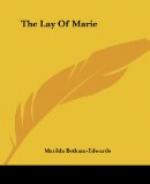It was the time of Pentecost
the bless’d,
When royal Arthur held the
accustom’d feast,
When Carduel’s walls
contained the vast resort
That press’d from every
land to grace his plenar court.
There did the sovereign’s
copious hand dispense
Large boons to all with free
magnificence,
To all but one; from Bretany
he came,
A goodly knight, Sir Lanval
was his name.
Long had the king, by partial
temper sway’d,
His loyal zeal with cold neglect
repaid;
Yet from a throne Sir Lanval
drew his birth,
Nor could all England boast
more comeliness and worth.
Whate’er the cause,
no gift the monarch gave,
The knight with honest pride
forbore to crave,
Till at the last, his substance
all forespent,
From his lord’s court
the hopeless liegeman went.
No leave he took,
he told no mortal wight,
Scarce had he thought to guide
his steps aright,
But all at random, reckless
of his way,
He wander’d on the better
half of day.
Ere evening fell he reached
a pleasant mead,
And there he loos’d
his beast, at will to rest or feed;
Then by a brook-side down
his limbs he cast
And, pondering on the waters
as they pass’d,
The while his cloak his bended
arm sustain’d,
Sadly he sat, and much in
thought complain’d.
So mus’d
he long, till by the frequent tread
Of quickening feet constrain’d,
he turn’d his head;
Close by his side there stood
a female pair,
Both richly clad, and both
enchanting fair;
With courteous guise the wondering
knight they greet
With winning speech, with
invitation sweet
From their kind mistress,
where at ease she lay,
And in her tent beguil’d
the lingering day.
Awhile Sir Lanval reft of
sense appear’d;
Then up at once his mailed
limbs he rear’d,
And with his guides impatient
to proceed,
Though a true knight, for
once forgot his steed.
And now with costliest
silk superbly dight,
A gay pavilion greets the
warrior’s sight;
Its taper spire a towering
eagle crown’d,
In substance gold, of workmanship
renown’d.
Within, recumbent on a couch,
was laid
A form more perfect than e’er
man survey’d:
The new-blown rose, the lily’s
virgin prime,
In the fresh hour of fragrant
summer-time,
Though of all flowers the
fairest of the fair,
With this sweet paragon might
ill compare;
And o’er her shoulders
flow’d with graceful pride,
Though for the heat some little
cast aside,
A crimson pall of Alexandria’s
dye,
With snowy ermine lin’d,
befitting royalty;
Yet was her skin, where chance
bewray’d the sight,
Far purer than the snowy ermine’s
white.
‘Lanval!’ she
cried, as in amazed mood,
Of speech and motion void,
the warrior stood,
‘Lanval!’ she




